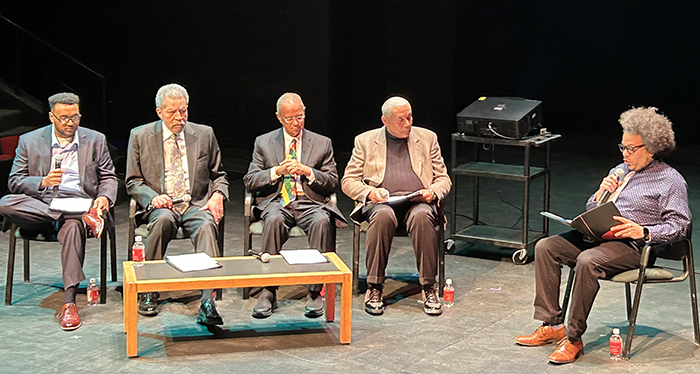County residents go down memory lane back to 1968
News | Published on March 14, 2023 at 3:33pm GMT+0000 | Author: Tucker Henderson
0MSUM alums trade stories from time in a fraternity, college

From left, Juron Griffin, nephew of the late Carl Griffin, Russell Balenger, Readus Fletcher, Lewis Scott and Jared Pigeon, far right moderator, MSUM’s director of diversity and inclusion. Photo taken at Gaede Stage adjacent to the Center for the Arts (Dille Center) on the MSUM campus in Moorhead.
By Tom Hintgen
Otter Tail County Correspondent
On Feb. 27 two rural Vergas retirees (Doug Safar and Dave Asleson) and retiree Tom Hintgen of Fergus Falls went back in time to 1968 at what was then Moorhead State College (now MSUM).
The three residents of Otter Tail County reconnected with Phi Sigma Epsilon fraternity brother Lewis Scott when Scott and two other African American males recalled their days at MSUM in the late 1960s and early 1970s.
This gathering was held at the Gaede Stage adjacent to the Center for the Arts (Dille Center) on the MSUM campus. A fourth speaker was the nephew of another late 1960s and early 1970s student (Carl Griffin) who passed away earlier in February 2023.
Scott, who currently lives near Atlanta, Ga., spoke about growing up in the Rondo area of St. Paul along with Russell Balenger and Readus Fletcher. The Rondo African American neighborhood was demolished in the Twin Cities between 1956 and 1968 to make way for the construction of Interstate 94 between Minneapolis and St. Paul.
Earlier in the day Scott and his wife, Graneze, met with Safar, Asleson, Hintgen and five other fraternity brothers dating back to 1968 at Moorhead State.
“MSUM really pulled out the red carpet for the Rondo brothers. However, Graneze and I both agree that our highlight was talking with my Phi Sig brothers,” Scott said.
Scott, after graduating from MSUM in 1973, was an educator and school administrator for close to 50 years, first in St. Paul and later in the Atlanta, Georgia, area.
He provided many memories of being among the first African Americans at Moorhead State College in the late 1960s and early 1970s.”
“Dorm life was greatly appreciated and faculty and staff members at Moorhead State led to a great experience,” said Scott during the panel discussion at the Gaede Stage near the MSUM Center for the Arts.
Scott looks back fondly of his growing up years in the St. Paul Rondo neighborhood.
“It was a neighborhood of caring and well-educated people,” he said. “We vere a neighborhood of dedicated workers who made family life a high priority. As kids we were encouraged to do our best while in school.”
His parents were among those who came to Minnesota after growing up in the deep south with segregation and Jim Crow laws designed to limit economic gains for African Americans.
“My father worked for the Great Northern Railroad,” Scott said. “Granted, we faced some racial issues in Minnesota but, generally, life was good.”
Scott said his parents instilled in him having a respect for others, all the while doing one’s best throughout life.
“My father met Moorhead State President Roland Dille who loved to travel by train along the Great Northern tracks between Fargo-Moorhead and the Twin Cities,” he said. “That’s one reason my father thought Moorhead State would be a good fit for me.”
All of the four Rondo residents from St. Paul managed to pay for their college educations at Moorhead State on their own. That was a reflection of the stable and hard working black community in the Twin Cities.
Looking back, Scott and the other two panelists said campus life in the late 1960s and early 1970s was not easy. They pointed to unrest following the assassinations of Martin Luther King and Robert F. Kennedy, protests of the Vietnam War, civil rights issues, marijuana usage and other challenges.
“Through it all, many of us realized that the way to make positive change was to work within the system,” Scott said. “Look for creative solutions and solve problems together.”

